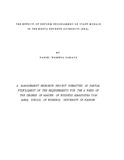| dc.description.abstract | The role of reforms is to take forward the development and strategic co-ordination of t h e
organizations development agenda to ensure that business planning supports service
delivery and therefore as such most reforms agenda focus on improving services by
meeting the expectations of their customers.
Staff morale consists of all the drives, forces and influences, conscious or unconscious
that causes an employee to want to achieve certain aims. Managers need to know about
the factors that create energy in order to be able to induce employees to work harder,
faster, more efficiently and more enthusiasm.
KRA was established in 1995 to take over the tax administration responsibilities of
revenue collection. The overall objective was to transform operational autonomy in
revenue administration and in the process the evolution of a modern flexible and
integrated revenue collection agency. Overall, good progress has been made towards
attainment of the same evidenced by gradual increase in revenue collection, upon
embarking on reform programmes in the year 2004.
The objective of the study was to determine the effects of reform programmes on staff
morale in the Kenya Revenue Authority (KRA).
In the literature review the researcher examined the role of staff in the success of the
reforms which is very crucial in implementations of the reforms programmes. The
researcher also went further and highlighted the major components of reforms and how
they have played a significant role in driving the reforms. Further effort was also made to
establish the effects of reform programmes on staff morale in various organizations in
various secondary data sources, which formed the framework through which this study
was to be undertaken.
The aspect of staff morale and motivation was also carefully researched and studied to
provide a deeper understanding on the issues that form the framework and foundation
through which staff morale is understood and can be boosted in the organizations.
This was a case study which sought to investigate and determine the effects of reform
programmes on morale of the staff of KRA. It was be limited to KRA staff based at the
head office as well as the Managers who played key roles in the implementation of the
reforms. Both primary and secondary data was collected though the study relied mainly
on the primary data sources.
The data was collected from a population of fifty respondents working at KRA. The
findings were presented in percentages, frequency distribution (Mean and Standard
Deviation), graphs and written reports. The data analysis, findings and interpretation
clearly highlighted on the major variables discussed in the study and their fundamental
relation to reforms programme as well as their contribution to staff morale at the Kenya
Revenue Authority.
The study clearly shows that reform programmes contributed greatly to boosting staff
morale at KRA. Staff felt that reforms impacted positively in the way work is done at
KRA hence boosting their morale.
The researcher also recommended various intervention measures in line with findings of
the study which included; improvement of salary and benefits to commensurate with
qualifications and work experience, putting in place relevant training programmes and the
need to foster a sense of teamwork amongst staff in KRA. | en_US |



